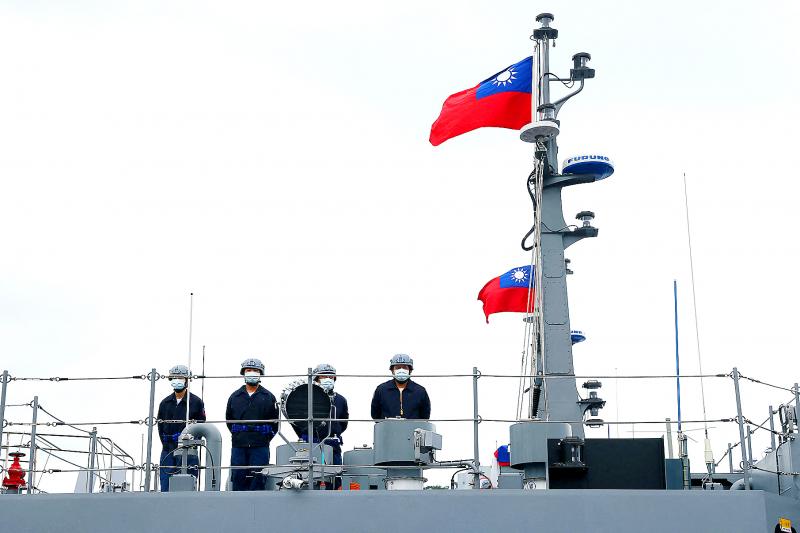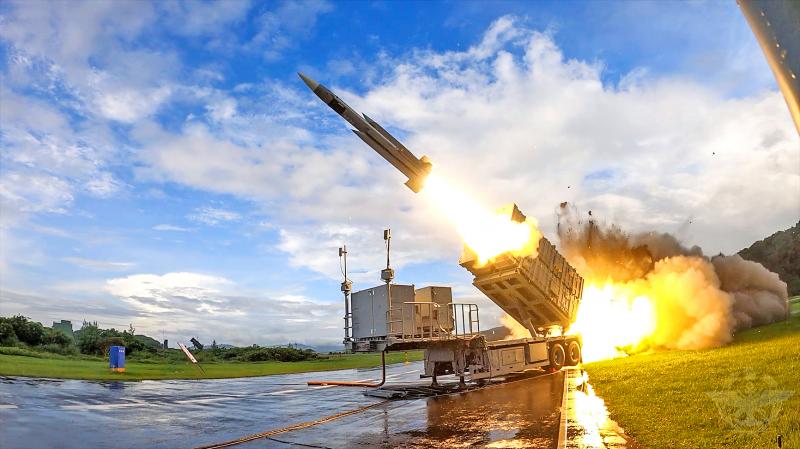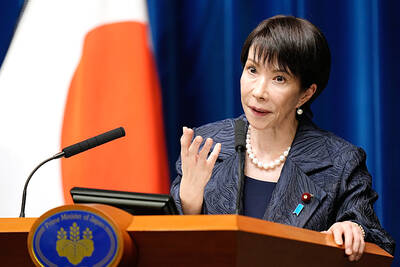On Taiwan’s tiny Penghu islands, the missile bases that sit next to white-sand beaches and bustling fish markets are a visceral reminder of the constant threat of attack from China.
Despite the huge military discrepancy between the two sides, many analysts believe that Taiwan’s location, inhospitable terrain and US support would make a full-scale invasion extremely difficult for China — and possibly too costly to countenance.
Recent record incursions of Chinese fighter jets into Taiwan’s air defense identification zone and increasingly aggressive rhetoric from the administration of Chinese President Xi Jinping (習近平) have raised fears that China might contemplate acting on a pledge to “reunify” Taiwan sooner rather than later.

Photo: Ann Wang/Reuters
The Chinese Ministry of National Defense last week said it would “not hesitate to start a war” to “stop Taiwan from becoming independent.”
One US admiral said an attack could come by 2027, the centenary of China’s People’s Liberation Army (PLA).
“If we were to go head to head militarily, we don’t stand a single chance,” said retired admiral Lee Hsi-min (李喜明), who was head of Taiwan’s armed forces until 2019.

Photo: EPA-EFE
However, Russia’s failure to quickly overrun Ukraine stands as a cautionary tale for Beijing, while simultaneously providing Taipei with tactical blueprints and inspiration on how to hold off a much larger enemy.
“Our soldiers here are all Taiwanese and will be fighting to defend their homeland,” said Chen Ing-jin, a Penghu historian and architect. “That makes a difference. Just look at Ukraine.”
Taiwan’s biggest advantage is its geography.
Amphibious assaults are exceedingly difficult, and if China were to invade Taiwan — and, crucially, hold it — Beijing would need to move hundreds of thousands of troops, along with equipment, across the Taiwan Strait.
Even at its narrowest point, the strait is 130km and weather conditions are notoriously unforgiving, especially during two monsoon seasons. That leaves just two brief “windows of attack” — May to July and October — for such a large-scale operation, a US Naval War College report said.
In addition, studded into the waters are outlying islands like the Penghu chain — bristling with radar and missiles pointing out into the strait. With the likely early warning and the weaponry Taipei has at its disposal, the PLA would probably incur high losses in that first stage of transit, said James Char, associate research fellow at Singapore’s S. Rajaratnam School of International Studies.
While the small, flat outlying islands might in the end prove easy for Beijing to subdue, on Taiwan’s main island, the opposite applies.
The coastal terrain “is a defender’s dream come true,” said Ian Easton, author of The Chinese Invasion Threat.
He and his colleagues estimate that Taiwan only has 14 small beaches suitable for landing, and they are bordered by mountains, cliffs or dense urban infrastructure.
“Landing on Taiwan is only part of the problem,” said Bonny Lin (林洋), director of the China Power Project at the Center for Strategic and International Studies.
Progress through Taiwan’s wetlands, mountains and densely populated urban areas would require a huge range of combat skills and weapons.
“How is it going to sustain those forces once they’re in position and advancing?” Lin asked. “How is it going to do the logistics?”
China has spent the equivalent of hundreds of billions of US dollars upgrading its military capabilities over the past decade, and its statistical dominance over Taiwan is enormous.
The PLA has more than 1 million ground force personnel to Taiwan’s 88,000; 6,300 tanks compared with 800; and 1,600 fighter jets to 400, US Department of Defense data show.
Washington also estimates that Beijing has the world’s largest navy by ship number. A recent US Naval War College paper described those ships as “increasingly sophisticated, capable vessels.”
However, many experts, including Char and Lin, question whether they are yet capable enough.
Atlantic Council senior adviser Harlan Ullman put it more forcefully in a February paper: “China simply lacks the military capability and capacity to launch a full-scale amphibious invasion of Taiwan for the foreseeable future.”
In the meantime, Taiwan has plans to counter China’s might in numbers, with Lee highlighting asymmetric warfare — an emphasis on mobility and precision attacks — an approach US officials are reportedly encouraging. Lee pointed to the success of the Ukrainian mobile missile launcher that sank Russia’s Black Sea flagship, the Moskva.
Taiwan has built up stockpiles of mobile missile batteries and shoulder-launched weapons, but he said they need substantially more.
The factor that preoccupies Beijing most is who else might get involved in the conflict, Chinese military expert Song Zhongping (宋忠平) said.
“The difficulty of liberating Taiwan lies in the potential intervention of the United States. It’s the biggest obstacle for the PLA to clear,” he said.
The US officially maintains a policy of “strategic ambiguity” on whether it would intervene militarily in the event of an invasion. Regardless, it supplies Taiwan with military hardware, while US President Joe Biden has said multiple times that Washington would intervene.
The “extent, depth and breadth” of US and other allies’ involvement would greatly determine how any conflict would play out, Song said.
Even without a military intervention, Char said the threat of economic sanctions, such as those placed on Russia, would give Chinese leadership pause for thought.
Whether China would be prepared to cause mass casualties with an invasion, while risking its domestic and international image, is a fundamental question.
“You need to let China know that it will suffer tremendous losses, and even then it may still not be able to occupy Taiwan,” Lee said. “So that China will think that the best way to resolve the Taiwan problem is by peaceful means.”

The Ministry of Foreign Affairs (MOFA) yesterday voiced dissatisfaction with the Comprehensive and Progressive Agreement for Trans- Pacific Partnership (CPTPP), whose latest meeting, concluded earlier the same day, appeared not to address the country’s application. In a statement, MOFA said the CPTPP commission had "once again failed to fairly process Taiwan’s application," attributing the inaction to the bloc’s "succumbing to political pressure," without elaborating. Taiwan submitted its CPTPP application under the name "Separate Customs Territory of Taiwan, Penghu, Kinmen and Matsu" on Sept. 22, 2021 -- less than a week after China

THE GOOD WORD: More than 100 colleges on both sides of the Pacific will work together to bring students to Taiwan so they can learn Mandarin where it is spoken A total of 102 universities from Taiwan and the US are collaborating in a push to promote Taiwan as the first-choice place to learn Mandarin, with seven Mandarin learning centers stood up in the US to train and support teachers, the Foundation for International Cooperation in Higher Education of Taiwan (FICHET) said. At the annual convention of the American Council on the Teaching of Foreign Languages held over the weekend in New Orleans, Louisiana, a Taiwan Pavilion was jointly run by 17 representative teams from the FICHET, the Overseas Community Affairs Council, the Steering Committee for the Test of Proficiency-Huayu, the

A home-style restaurant opened by a Taiwanese woman in Quezon City in Metro Manila has been featured in the first-ever Michelin Guide honoring exceptional restaurants in the Philippines. The restaurant, Fong Wei Wu (豐味屋), was one of 74 eateries to receive a “Michelin Selected” honor in the guide, while one restaurant received two Michelin stars, eight received one star and 25 were awarded a “Bib Gourmand.” The guide, which was limited to restaurants in Metro Manila and Cebu, was published on Oct. 30. In an interview, Feng Wei Wu’s owner and chef, Linda, said that as a restaurateur in her 60s, receiving an

MORE RETALIATION: China would adopt a long-term pressure strategy to prevent other countries or future prime ministers following in Sanae Takaichi’s steps, an academic said Taiwan should maintain communications with Japan, as Japanese Prime Minister Sanae Takaichi is to lead a revision of security documents, Taiwanese academics said yesterday. Tensions have risen between Japan and China over remarks by Takaichi earlier this month that the use of force against Taiwan would constitute a “survival-threatening situation” for Japan. Prospect Foundation president Lai I-chung (賴怡忠) yesterday said Takaichi’s stance regarding Taiwan is the same as past Japanese prime ministers, but her position is clearer than that of her predecessors Fumio Kishida and Shigeru Ishiba. Although Japan views a “Taiwan contingency” as a “survival-threatening situation,” which would allow its military to